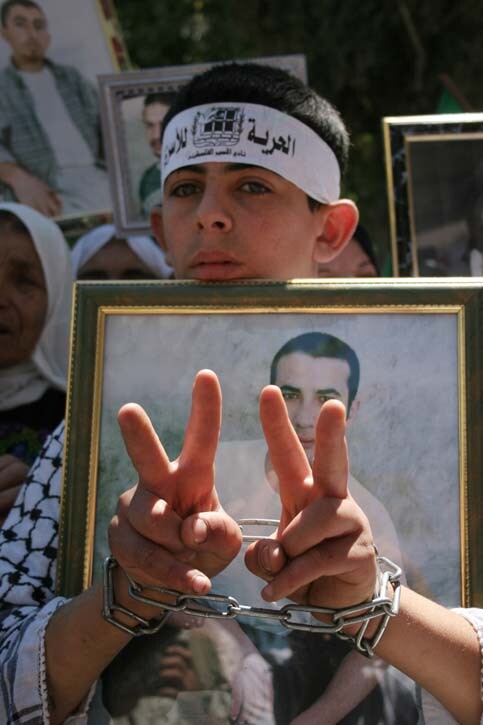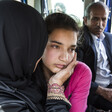The Electronic Intifada 27 June 2006

Palestinians hold pictures of jailed relatives during a demonstration in the West Bank city of Hebron calling for the release of Palestinian prisoners being held in Israeli jails June 27, 2006. (MaanImages/Mamoun Wazwaz)
Kidnap[*], killings, and night raids on Israeli military army bases may not be the most effective way of reaching out to international opinion, but by conditioning the release of Israeli hostage Gilad Shalit on the release of some 380 Palestinian child prisoners, the Palestinian Popular Resistance Committees have touched on an issue which has resonance well beyond the immediate tit-for-tat killings and recriminations that have a tendency to dominate international media coverage of the ‘Middle East conflict.
The plight of Palestinian children arrested by the Israeli army has long been one of the neglected aspects of Israeli occupation, involving some 600 minors a year since the outbreak of the second Intifada in September 2000. Nearly all are held without access to legal support during questioning, often compelled to sign confessions in Hebrew, a language they don’t understand, while subjected to intimidation and mistreatment as a matter of routine course. It starts with the arrest itself, which can take place during night-time incursions or mass arrest campaigns, or alternatively at the military checkpoints which have played such a part in curtailing the economic and social life of the West Bank. After a night or two behind bars, some minors are released without charge, while the unfortunate ones, around 300 a year, start their passage through the Israeli military justice system which stands as the rule of law in the Occupied Palestinian Territories. This system allows no special provisions for minors, despite the fact that Israel is a signatory of numerous international treaties which demand due consideration for age in the legal process, not least of which is the UN Convention on the Rights of the Child. Those considerations are, by contrast, applied to Israeli minors, including those living cheek by jowl with the Palestinians in illegal West Bank settlements.
Life doesn’t improve on the inside, with Palestinian children routinely reporting torture or mistreatment. In a typical recent case, Defence for Children International (DCI) defended two 13-year olds arrested for stone throwing near the ‘separation barrier’ in the South of the West Bank. The pair, Zakariyah and Nemer, were roughly handled on arrest, blindfolded and kicked, before being taken to a detention centre in the illegal settlement of Gush Etzion near Hebron. There, the boys spent 16 days in a small cell with up to 17 other people, sleeping on the floor and allowed access to the bathroom for half an hour once a day. The remaining 23 hours and 30 minutes were spent locked in the squalid cell, with no contact allowed with either friends or family.
At the hearing, which was presided over by a single military judge, the prosecutor asked for ‘only’ a seven month custodial sentence for stone-throwing, while the defence pushed for a non-custodial sentence. In the end, the pair were relatively fortunate to receive 90-days imprisonment, a 60-day suspended sentence and a fine of NIS 1,000 ($230), which was upheld under appeal after the prosecutor asked for more. The children spent the rest of the sentence in a facility with Israeli child prisoners at Telmond prison outside Haifa. When the time came for release, they were set free at an Israeli checkpoint outside Tulkarem in the Northern West Bank and left to make their own way down the length of the West Bank to their own village of Bet Awwar.
The experience of these two 13-year olds is by no means exceptional, echoing the testimonies of other minors caught up in Israel’s system of military justice, where internationally-agreed concepts such as the ‘best interests of the child,’ ‘proportionality’ and a weighting towards non-custodial sentences for minors are held in light regard. The PRC’s tactics may not be a legitimate way to highlight these abuses, but that doesn’t mean that the demands themselves lack merit, not least in highlighting the systemic abuses and mistreatment that feed into ongoing Palestinian resistance and violence. If Israel, as a paid-up member of the international community, can hold international humanitarian law in such light regard even for 13-year olds, what hope that those Palestinian minors will grow up with any respect for those same principles? And with minors representing some 53% of the population, continued abuse of their rights sees Israel actively cultivating a legacy of future hatred, with apparently little willingness by the outside world to hold it to account.
[*]Editor’s Note: The dictionary definition of the word “kidnap” necessitates that the abduction of a person is illegal. As the Israeli soldier was part of an occupying force, captured during a military raid against a military target, in international law he is considered to be a “prisoner of war”, not a kidnap victim. The rules governing the treatment of prisoners of war are spelled out in the third Geneva Convention of 1949, article 13 of which requires that POWs “must at all times be treated humanely”.
Catherine Hunter is a Middle East consultant for the Coalition to Stop the Use of Child Soldiers and a former Research Coordinator at Defence for Children International, Palestine Section which deals with over half of the cases involved Palestinian minors in the Israeli military courts. The views expressed in this article represent the author’s own.
Related Links



